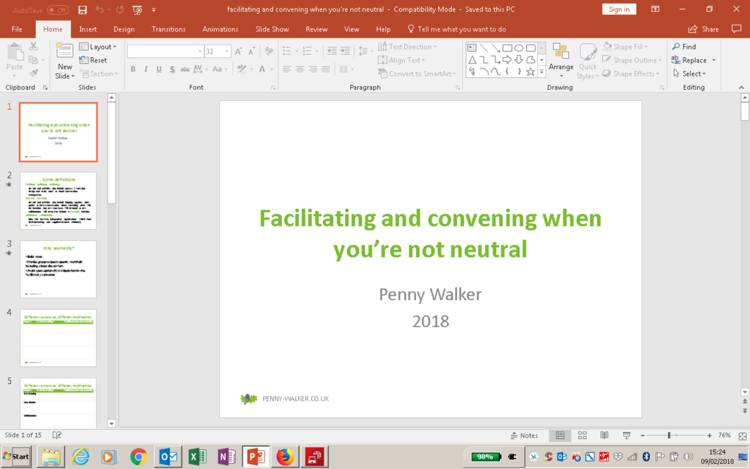Many organisations in the sustainability field do their best system-changing work when they are collaborating. And they find themselves in a challenging situation - playing the role of convening and facilitating, whilst also being a collaborator, with expertise and an opinion on what a good outcome would look like and how to get to it. This dual role causes problems. Here’s how to fix them.
Keep it sheepy!
acilitators need to stay out of the content- which belongs to the group - and intervene only to improve process. (There's more on this here: the neutral facilitator.) But sometimes we get tempted to smuggle in our own views when we question or reflect back to the group.
The neutral facilitator
So often, in our field, we find ourselves straddling roles: playing the facilitator role in a meeting when we (or the organisation we work for) has a preferred type of outcome in mind. A professional independent facilitator shouldn't have this problem: if your ability to stay out of the content is at risk because of strong personal opinions about the topic, then you don't take the job.
But if your organisation has, for example, an environmental or sustainability mission, then you may need to ensure that this mission is reflected in the group's conversation. Or if you are the sustainability lead in your organisation, you may want to ensure that colleagues challenge each other enough on environmental limits, ethics and social justice during internal workshops.
I have been spending a lot of time recently training people from organisations which clearly have an agenda, and yet where it definitely makes sense for staff to have good facilitation skills. The question of how to manage this 'agenda' dilemma has come up.
A lot of the reflection is on how they know when it would be appropriate or not for them to facilitate, what they do if they notice their own agenda coming to the fore and interfering with their facilitator role, and how to manage this tension in preparation and in the moment.
What are your options?
Don’t facilitate the meeting. Explain your conflict of interest and ask the meeting’s convenor, host or planning group to find an alternative facilitator.
Ask someone else to attend the meeting as a participant, who you know will ensure that your own interests are represented. For example, a colleague or someone from a similar organisation which shares your interests. This is a particularly useful strategy if it's important that someone champions being ambitious about strong sustainability.
Step out of role. If the conversation unexpectedly begins to cover topics in which you have an interest, tell the group that this has happened and ask their permission to temporarily step ‘out of role’ as facilitator. Have your say, and then clearly step back into role.
Flag the role conflict and ask the group to help you stay independent. Tell the group that your intention is to be a neutral facilitator, and that you positively welcome them flagging it up if they think you are not behaving in a neutral way.
What place knowledge?
Another kind of neutrality relates to knowledge of the topic under discussion. Facilitators often maintain that knowledge of the topic under discussion is not necessary, and I'd agree with that - with some caveats (see below).
Sometimes experts take on the facilitator role for reasons which seem obscure and probably stem from misunderstanding of facilitation skills and practices in the client's and expert's mind. (A senior Judge of my acquaintance was once asked to 'facilitate' a workshop session on his area of expertise. I was astounded! He is very expert and experienced: why would you ask him to put his specialist knowledge away and play the 'servant'. A waste of his skills. I can only imagine that the event organisers did not know what facilitators do, and used the word as a fashionable alternative to 'lead'.)
And sometimes clients opt for a facilitator who does have experience or knowledge of the topic, because they imagine this will make the person a better facilitator.
And I think they could be right!
When knowledge helps
There are a few, limited ways in which knowledge can help your facilitation, in my experience.
- Jargon and acronyms - If you are the only person in the room who doesn't know the technical language, and you need to have it explained to you, this can slow things down and irritate the group. If you are also acting as a scribe, then spelling things wrongly can undermine the trust the group has in you. Ask for a glossary as part of your briefing!
- Stick to the point - it can be hard to tell whether someone is wandering off from the aims of the discussion, if you don't know the subject. Is it irrelevant to talk about interference with sonar when discussing the environmental impact of wind turbines? (*) When discussing low-income customers, will discussing local currencies be time well spent? (#)
- Digging deeper - the flip side of not recognising whether someone is 'on topic' or not, is failure to spot important distinctions. If one participant talks about biofuels and the other about bioenergy, is this just a pleasant variety of words to avoid boredom, or a crucial distinction worth exploring? If you know a bit about the field, your guess is more likely to be a good one.
Caution! I do not intend to imply that you can assume your knowledge is sufficient to make these judgements on behalf of the group. If you think something may be off the point, you'd still want to check this out with the group because this is their decision. Knowing a bit helps you to make better guesses.
Download
There is a short download on this, here.
Discuss
Join in the discussion in the comments thread. There's also a very lively thread over at the IAF Linked-In group. If you're a member of that group, you can add your perspective here.
Answers
* No - there are concerns about bats being affected by turning blades, although whether sonar / echolocation is involved is unclear. So not irrelevant.
# Yes - if there is a viable local currency already established in an area, then this could well be a useful suggestion. So not irrelevant.
Leadership teams for collaboration
"Who will make sure it doesn't fall over?"
This was a question posed by someone in a workshop I facilitated, which brought together stakeholders (potential collaborators) who shared an interest in a water catchment.
It was a good question. In a collaboration, where equality between organisations is a value - and the pragmatic as well as philosophical truth is that everyone is only involved because they choose to be - what constitutes leadership? How do you avoid no-one taking responsibility because everyone is sharing responsibility?
If the collaboration stops moving forwards, like a bicycle it will be in danger of falling over. Who will step forward to right it again, give it a push and help it regain momentum?
Luxurious reading time
I've been doing some reading, in preparating for writing a slim volume on collaboration for the lovely people over at DōSustainability. (Update: published July 2013.) It's been rather lovely to browse the internet, following my nose from reference to reference. I found some great academic papers, including "Collaborative Governance in Theory and Practice" by Chris Ansell and Alison Gash. This paper is based on a review of 137 case studies, and draws out what the authors call 'critical variables' which influence the success of attempts at collaborative governance.
It's worth just pausing to notice that this paper focuses on 'collaborative governance', which you could characterise as when stakeholders come together to make decisions about what some other organisation is going to do (e.g. agree a management plan for a nature reserve ), to contrast it with other kinds of collaboration where the stakeholders who choose to collaborate are making decisions about what they themselves will do, to further the common or complementary aims of the collaboration (e.g. the emerging work of Tasting the Future).
Leadership as a critical variable
Ansell and Gash identify leadership as one of these critical variables. They say:
"Although 'unassisted' negotiations are sometimes possible, the literature overwhelmingly finds that facilitative leadership is important for bringing stakeholders together and getting them to engage each other in a collaborative spirit."
What kind of person can provide this facilitative leadership? Do they have to be disinterested, in the manner of an agenda-neutral facilitator? Or do they have to be a figure with credibility and power within the system, to provide a sense of agency to the collaboration?
Interestingly, Ansell and Gash think both are needed, depending on whether power is distributed relatively equally or relatively unequally among the potential collaborators. It's worth quoting at some length here:
"Where conflict is high and trust is low, but power distribution is relatively equal and stakeholders have an incentive to participate, then collaborative governance can successfully proceed by relying on the services of an honest broker that the respective stakeholders accept and trust."
This honest broker will pay attention to process and remain 'above the fray' - a facilitator or mediator.
"Where power distribution is more asymmetric or incentives to participate are weak or asymmetric, then collaborative governance is more likely to succeed if there is a strong "organic" leader who commands the respect and trust of the various stakeholders at the outset of the process."
An organic leader emerges from among the stakeholders, and my reading of the paper suggests that their strength may come from the power and credibility of their organisation as well as personal qualities like technical knowledge, charisma and so on.
While you can buy in a neutral facilitator (if you have the resource to do so), you cannot invent a trusted, powerful 'organic' leader if they are not already in the system. Ansell and Gash note "an implication of this contingency is that the possibility for effective collaboration may be seriously constrained by a lack of leadership."
Policy framework for collaboration
I'm also interested in this right now, because of my involvement in the piloting of the Catchment Based Approach. I have been supporting people both as a facilitator (honest broker) and by building the capacity of staff at the Environment Agency to work collaboratively and 'host' or 'lead' collaborative work in some of the pilot catchments. The former role has been mainly with Dialogue by Design, and latter with InterAct Networks.
One of the things that has been explored in these pilots, is what the differences are when the collaboration is hosted by the Environment Agency, and when it is hosted by another organisation, as in for example Your Tidal Thames or the Brent Catchment Partnership.
There was a well-attended conference on February 14th, where preliminary results were shared and Defra officials talked about what may happen next. The policy framework which Defra is due to set out in the Spring of 2013 will have important implications for where the facilitative leadership comes from.
One of the phrases used in Defra's presentation was 'independent host' and another was 'facilitator'. It's not yet clear what Defra might mean by these two phrases. I immediately wondered: independent of what, or of whom? Might this point towards the more agenda-neutral facilitator, the honest broker? If so, how will this be resourced?
I am thoughtful about whether these catchments might have the characteristics where the Ansell and Gash's honest broker will succeed, or whether they have characteristics which indicate an organic leader is needed. Perhaps both would be useful, working together in a leadership team.
Those designing the policy framework could do worse than read this paper.

